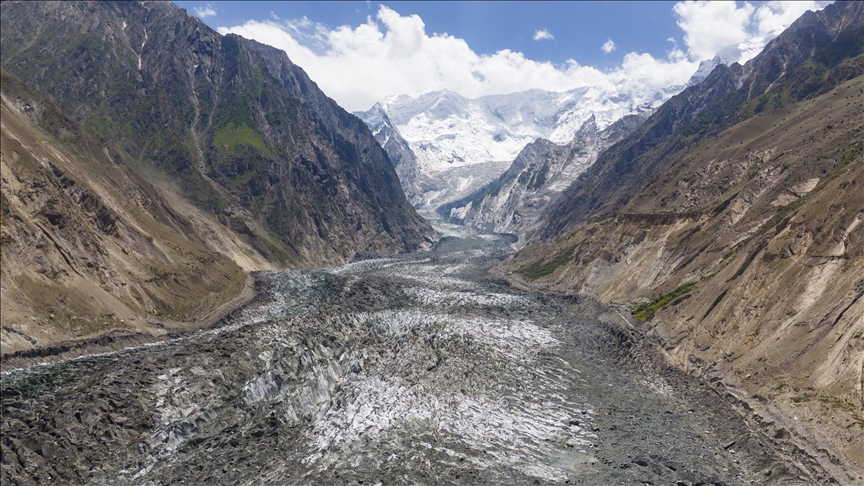Pakistan’s mineral wealth draws global powers amid race for critical resources
Located in remote Chaghi district, Reko Diq is one of world's largest undeveloped copper-gold deposits

- Pakistan boasts mineral wealth worth as much as $8T, which includes key resources such as copper, gold, lithium and rare earth elements
- Islamabad is set to launch advanced hyperspectral satellite next month to assist in exploring underground resources
KARACHI, Pakistan
As global powers scramble for control over the minerals driving the future, Pakistan is pinning its hopes on what experts say is one of the world’s largest undeveloped mineral deposits.
Japan is the latest country to show interest in investing in Pakistan’s flagship mining project, with China and the US already vying to secure major shares.
Islamabad was informed late last month that Tokyo is keen to invest in the multi-billion-dollar Reko Diq copper-gold mine, weeks after the Asian Development Bank approved a $410 million financing package for the project.
Oil-rich Saudi Arabia has also expressed interest in investing in the project, including acquiring a possible 15% stake.
Located in the remote Chaghi district of southwestern Balochistan province, Reko Diq represents one of the world’s largest undeveloped copper-gold deposits.
Operated by mining giant Barrick Gold Corporation in partnership with Pakistan’s federal and Balochistan provincial governments, Reko Diq is estimated to contain 25.6 billion pounds (11.6 billion kilograms) of copper and 13.3 million ounces (377 million grams) of gold in inferred and indicated resources.
The deposit ranks among the top five undeveloped copper-gold projects worldwide.
Scheduled to start in 2028, the project aims for an annual production capacity of 80 million tonnes of ore and 200,000 tons of copper, with a mine life exceeding 40 years.
And Reko Diq is only the beginning, as Pakistan’s mineral wealth is valued at between $6 and $8 trillion.
- Game changer
"Pakistan has vast untapped energy potential and America should be its partner in developing it,” US President Donald Trump declared after meeting with Pakistan's army chief Gen. Asim Munir in a rare diplomatic event in August.
The meeting was followed by a $500 million investment deal between the Frontier Works Organization – Pakistan’s largest miner of critical minerals – and Missouri-based US Strategic Metals that includes setting up a polymetallic refinery in Pakistan.
Last week, Beijing said Islamabad has assured that Pakistan’s cooperation with the US in the minerals sector "won’t undermine" its ties with China.
“China and Pakistan have communicated on the issue of Pakistan-US mineral cooperation,” Foreign Ministry spokesman Lin Jian said at a news conference.
The Pakistani side “stressed its engagement with the US would never undermine China’s interests and China-Pakistan cooperation,” said Lin.
Islamabad plans to launch an advanced hyperspectral satellite this month, which will assist in exploring underground mineral resources.
The satellite will analyze different wavelengths of light reflected from the Earth’s surface, generating precise information about minerals, vegetation, soil and water quality, said Muhammad Yousaf Khan, chairman of the Space and Upper Atmosphere Research Commission.
"This advancement will enable Pakistan to independently map its mineral reserves and pave the way for more efficient use of natural resources,” he added.
Beyond hydrocarbons, Pakistan’s mineral wealth includes copper, gold, lithium and rare earth elements – all vital for clean energy transitions and technological security.
Gold is essential for the aerospace industry, while copper is critical for electricity, renewable energy systems and construction. Chromium is used in wind turbines and solar panels, while manganese is key for fertilizers and electric vehicle batteries. Zinc, too, is vital for the auto industry and durable construction materials.
Pakistan is also believed to hold rare minerals such as antimony, used for heat resistance in technologies including superconductors, semiconductors, ammunition and batteries.
China banned exports of antimony in December last year.
"We are talking about trillions of dollars as far as Pakistan's untapped mineral wealth is concerned," said Ayla Majid, an expert in project development and financial advisory across energy, infrastructure and industrial sectors.
Speaking to Anadolu, Majid said the country’s vast but underdeveloped mineral sector could transform Pakistan’s economy.
"It will not only attract significant foreign direct investment but also stimulate related industries, including local machinery manufacturing, skill development and infrastructure expansion," she said.
Muhammad Saad Ali, a Karachi-based energy expert, told Anadolu that although there has been no official valuation of Pakistan’s mineral wealth, Reko Diq alone could hold more than $60 billion worth of copper and gold.
Reko Diq and other mineral projects will strengthen the critical minerals supply chain across the region and beyond, he added.
"The renewed US interest in Pakistan is because of these minerals, because for the US, diversifying supply chains for these sectors is a strategic priority," Ali said.
Majid, who is also Global President of the Association of Chartered Certified Accountants, said Pakistan could attract investment by partnering with both the US and China.
"Pakistan has a history of effectively coexisting with these two rivals, and it is well-positioned to navigate the new evolving landscape," she said.
China has already been engaged in the Saindak mining project, a joint venture focused on the extraction of copper, gold and silver in the Chagai district. Established in the mid-1990s, the project is a key player in Pakistan’s non-ferrous mining sector.
- No walk in the park
Beyond Balochistan, the northwestern province of Khyber Pakhtunkhwa and the northern region of Gilgit-Baltistan are also rich in mineral resources.
To harness this potential, Pakistan has introduced the National Minerals Harmonization Framework, already adopted by the Balochistan government, to streamline mining approvals and cut red tape.
But the path forward will not be without challenges.
"Pakistan currently faces a range of obstacles, from economic constraints to the need for investment in infrastructure and skills, as well as issues related to law and order and modern mining technology," Majid said.
Balochistan and Khyber Pakhtunkhwa have long experienced militant attacks, she added, which must be addressed to create a secure environment for foreign investment.
Developing a strong road network connecting mining areas with industrial hubs and ports is crucial, she said, also urging consistency in relevant policies.
"There are risks and challenges, but these should not deter the government from seizing this landmark opportunity to reshape the country's future. It would represent a significant leap forward in terms of progress and prosperity, but it requires dedication and consistent policy efforts," she said.
Amir Rana, an Islamabad-based political and security analyst, described the US move as a “desecuritization” of its relations with Pakistan.
"Their economic impact will surface once these projects are implemented. But this is an indication that the US is taking out its relations with Pakistan from the security domain to the geo-economic arena," Rana told Anadolu.
"It's so far a good sign for Pakistan."
Anadolu Agency website contains only a portion of the news stories offered to subscribers in the AA News Broadcasting System (HAS), and in summarized form. Please contact us for subscription options.







